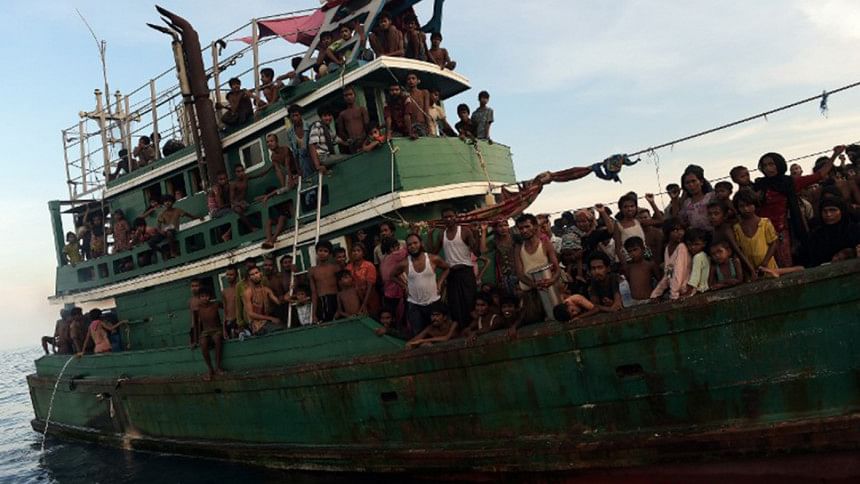Myanmar can't be forced, says Thai PM

Thailand could not force countries to attend a regional meeting in Bangkok this month to discuss how to manage the crisis over Bangladeshi and Rohingya migrants as every country has its own dignity, Prime Minister Prayut Chan-o-cha said yesterday.
He was referring to a surprising outburst by a Myanmar's presidential office director Zaw Htay, who said his country would not attend the meeting on May 29 and that Bangkok had initiated the summit simply to divert attention from such problems.
Prayut said: "Whoever wants to come can come. However, for those who don't, no one can force them. Every country has equal dignity."
However, he said the meeting was for the sake of all countries and Thailand was non-partisan and aimed to bring peace to society. Myanmar is thought to prepare measure to deal with the matter.
Zaw Htay told AFP: "We are unlikely to attend... we do not accept it if they (Thailand) are inviting us just to ease the pressure they are facing."
He said the root cause of the crisis was increasing human trafficking and said the discovery of graves in the far south of Thailand stemmed from Bangkok's inability to prevent |trafficking and weak rule of law.
"The root cause [of the crisis] is increasing human trafficking. The problem of the migrant graves is not a Myanmar problem - it's because of the weakness of human trafficking prevention and the rule of law in Thailand."
Myanmar did not regard the smuggling of Muslim Rohingya as its problem because it never recognised the Rohingya as one of its ethnic groups, he said, although they have lived in Myanmar for long time.
The Rohingya face severe hardship in Myanmar for decades including state crackdowns and violence, which has forced them to flee to third countries with the hope finding better lives.
The regional conference on migration and human-trafficking problems will feature senior officials from 15 Indian Ocean countries and other nations.
Prayut proposed the meeting recently after dozens of graves were unearthed in Songkhla in camps believed to holding areas where migrants - Rohingya from western Myanmar or Bangladeshis who travel south by boat - and wait to be sneaked across the border to Malaysia.
Asked if the absence of Myanmar would have an impact on the meeting, Prayut said the present obstacle was how Myanmar perceives the Rohingya.
"The issue of nationality of Rohingya is an affair of Myanmar, we should not intervene and have to respect it," he said, adding that international organisations had the duty of talking to Myanmar.
The United States will send a representative to attend the May 29 meeting, US Embassy charge d'affaires Patrick Murphy said. He spoke during a visit to Nakhon Si Thammarat, where he was briefed by Governor Pheerasak Hinmuangkao about the situation of Rohingya migrants in the province.
The governor said the province was just a place of transit for people being smuggled to border areas. Investigation into the smuggling had not found provincial officials involved in the trafficking.
Meanwhile, State Department Press Office director Jeff Rathke said the US was concerned by reports of thousands of additional Rohingya migrants on land and at sea in boats who may need humanitarian protection and assistance. He called on the US to encourage its allies in the region to accept the refugees, and for the US to consider providing humanitarian assistance, including the use of reconnaissance imagery and the deployment of naval and air assets if necessary, to rescue those in danger.
In related news, the Organisation of Islamic Cooperation's special envoy for Myanmar, Syed Hamid Albar, is urging Asean to take a leading role to mobilise support to solve the humanitarian crisis involving the Rohingya. He said the group must call an urgent meeting to resolve the crisis and take a regional approach on the issue.
"We can't afford to have anymore tragedies involving the boat people from Myanmar. Malaysia, Indonesia and Thailand in particular must discuss how to take care of these refugees and not let them drift away at sea," said Syed.
"Asean cannot sit idly about the human trafficking from Myanmar. Asean must take position on how to solve this humanitarian crisis collectively and engage with Myanmar.
"I hope the foreign ministers of Asean can quickly do something about this. We know the source of the problem is Myanmar but at the moment, there's no better way than for Asean to sit down together and engage with Myanmar government," said Syed, a former Malaysian foreign minister.
He praised Malaysia for accepting responsibility of taking care of Rohingya for many years and stated that Malaysia as chairman of Asean could play an important role in managing the crisis, but said "it should not be one country alone in Southeast Asia addressing the crisis".
UN Secretary General Ban Ki-moon also urged governments to ensure that the obligation of rescue at sea is upheld. "He also urges governments to facilitate timely disembarkation and keep their borders and ports open in order to help the vulnerable people who are in need," a statement from his office said.

 For all latest news, follow The Daily Star's Google News channel.
For all latest news, follow The Daily Star's Google News channel. 



Comments